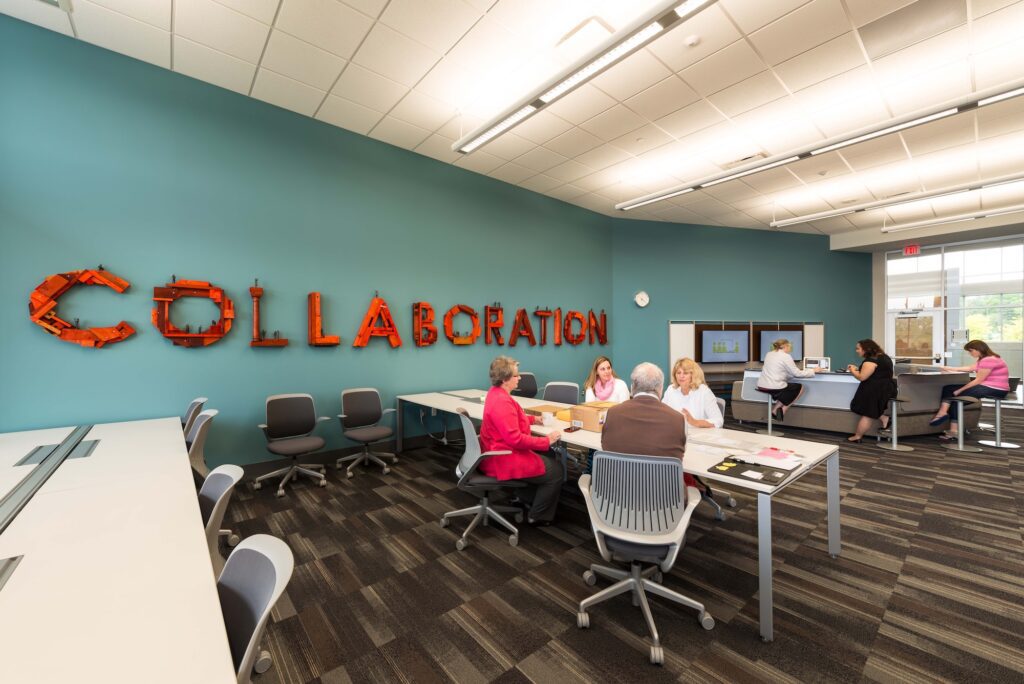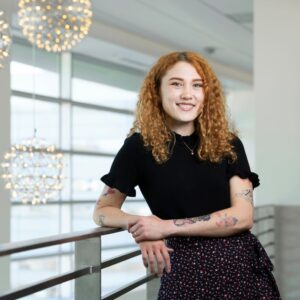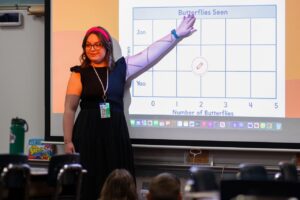UNO transforms and improves the quality of life locally, nationally and globally
by Karen Weber
Community engagement is embedded in the DNA of the University of Nebraska at Omaha (UNO). That’s the assessment of Julie Dierberger, Ph.D., UNO’s chief engagement officer and Paul Sather distinguished director of the UNO Service Learning Academy. Dierberger began her service as chief engagement officer in January 2024 upon the retirement of the first chief engagement officer, Sara Woods, MPA. Dierberger has served as the Service Learning Academy director since 2017.
Established in 2022, the Office of Engagement provides strategy, support and direction for campus-wide community engagement and oversees the Service Learning Academy, Volunteer and Civic Engagement Programs and the Barbara Weitz Community Engagement Center. In 2024, the leadership team reorganized, adding two Associate Directors – Rosey Higgs, MSW, Associate Director of the Service Learning Academy, and Jason Jones, Associate Director of the Office of Engagement.
This year also marks the 10th anniversary of the Barbara Weitz Community Engagement Center (CEC). The CEC is a hub for collaboration among students, faculty and community partners. Located in the heart of the Dodge campus, the 70,000-square-foot building serves as a destination for campus and community partnerships. In this unique space, UNO brings the public to campus for community events that support public good and community engagement. This open door to the campus has increased community awareness of all the university has to offer, and similarly, what the university can learn from the community.
Dierberger said, “The CEC is a visible testament to UNO’s metropolitan mission.”
“Community engagement is in our bones in how we do what we do,” Dierberger said. “At every turn, we teach and learn in an intentional, community-based way.”

UNO’s commitment to community engagement spans decades, encompassing diverse initiatives from service-learning classes to voter engagement efforts. Robyn Loos, MA, highlights the transformative power of these experiences, recalling her own journey from student to advocate within UNO’s Office of Engagement.
She said it opened her eyes to the value of engagement experiences as a student. In her role, she has witnessed firsthand how students, faculty and community partners make mutually beneficial connections.
“These connections with the community come not just through service learning, but the full spectrum of engaged research, creative activity, teaching, learning and community service,” said Loos.
The Office of Engagement also connects faculty with community partners to help students gain resume-building skills and experiences.
“This gives students opportunities to network and develop relationships,” Loos said. “These hands-on experiences can lead to becoming more engaged and productive members of society.”
Looking back, the vision for the CEC emerged over twenty-five years ago, championed by UNO administrators who envisioned a space where innovative partnerships benefit the community and campus.
BJ Reed, Ph.D., former senior vice chancellor for student and academic affairs, is one of many individuals who worked to develop the precursor of the CEC at 49th and Farnam Street. The facility housed several nonprofits.
Reed said the creation of the CEC also ties back to the Service Learning Academy and the support of Barbara Weitz, then a member of the UNO Grace Abbott School of Social Work faculty.
“The CEC was the culmination of putting engagement with nonprofits and community engagement with students conceptually in one place,” Reed said. “It was radical at the time – nothing like it had been created on a college campus.”
Reed indicated how important administrative support was to innovative ideas like the CEC. He credits former UNO Chancellor John Christensen, Ph.D., who shared his commitment to the community for prioritizing these efforts at UNO. Christensen, a former dean of the College of Education and vice chancellor, asked Reed to be his executive assistant to focus on community engagement.
“We worked jointly on various engaged activities. John and I also went to visit potential donors about their support for the concept. Without John’s support, I doubt it would have happened,” said Reed.
Woods said Christensen, Reed and Paul Sather, former Service Learning Academy director, and many others, were instrumental in seeing the value of a central location for community engagement – not only a home for the Service Learning Academy but other programs that foster the collaboration between the university and community.
The CEC became a reality due to the generosity of private donors such as the Weitz Family Foundation, William and Ruth Scott Family Foundation, Omaha Public Power District (OPPD), Union Pacific and others.
Both Woods and Dierberger say the Office of Engagement and the CEC demonstrate the value of community engagement at every level and will continue to offer opportunities for growth in outreach. They credit administrators, stakeholders and donors for envisioning the possibilities and impact the CEC has brought to UNO, the Omaha metro and beyond.
“The donors took a chance on us,” Woods said. “I take much pride in this collaboration and have no doubt engagement in all its forms will continue to thrive in years to come.”
As UNO celebrates milestones, the legacy of community engagement remains central to its identity, driving impactful initiatives that shape the future of education and service.





